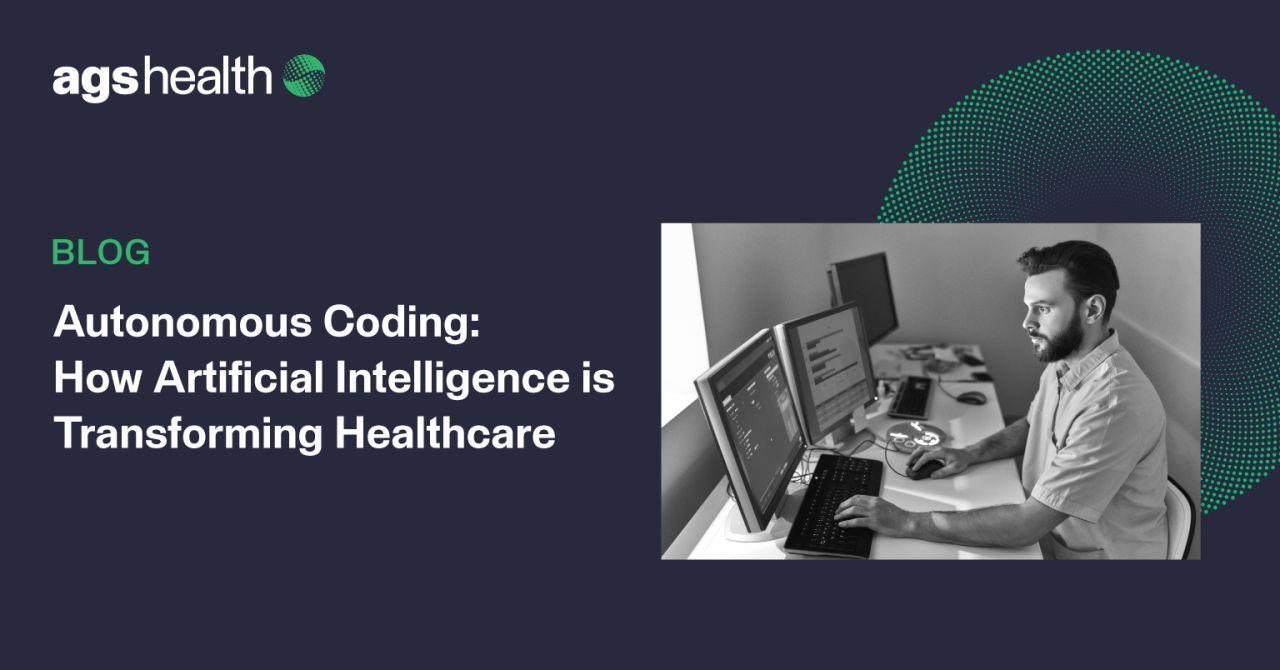Autonomous Coding: How
Artificial Intelligence is Transforming Healthcare
Artificialintelligence(AI)ismakingsignificantstridesinrevolutionizing variousaspectsofthehealthcareindustry.OneareawhereAIismakinga profoundimpactismedicalcoding.Medicalcodingisacriticalprocessthat ensuresaccurateandefficientbilling,reimbursement,andpatientcare. HealthcareorganizationsareautomatingmedicalcodingwiththehelpofAI technologies,suchasnaturallanguageprocessing(NLP)andmachinelearning (ML).Autonomouscodingsupportshealthcareorganizationgoals-improving accuracy,efficiency,andthepatientfinancialexperiencethankstofaster claimsprocessing.
AI Technologies in Medical Coding
Medicalcodinghastraditionallybeentheresponsibilityoftrained professionals.Duetothemanyhumantouchpointsinvolvedinmedicalcode updates,themarginoferrorissignificant.However,AIisautomatingthis process,reducingtheburdenonhumancoders,andstreamliningthecoding process.

Autonomouscodingsoftwareusesadvancedalgorithmstoanalyzelarge amountsofmedicaldata,including:
• Patientrecords
• Physiciannotes
• Labreports
• Diagnosticinformation
Byinterpretingandclassifyingthisdata,thesoftwarecanassignthe appropriatemedicalcodesanddoitmoreaccuratelyandefficientlythan humans.Advancedalgorithmsallowlargevolumesofpatientrecordstobe analyzedquickly,makingautonomouscodinganidealsolutionforhealthcare organizationsconstrainedbylaborshortagesorthoselookingtoreassign valuableteammemberstowardmorevalue-addedtasksorfunctions. Keytechnologiesfeaturedwithinautonomouscodingsoftwareinclude: Natural Language Processing (NLP): NLPenablescomputerstounderstand andanalyzehumanlanguage.Inmedicalcoding,NLPisvitalinextracting relevantinformationfromphysiciannotes,patientrecords,andunstructured textualdata.Byemployinginformationextractionandentityrecognition techniques,NLPalgorithmscanidentifyandcapturevitalmedicalconcepts, procedures,anddiagnoses,facilitatingfasterandmoreaccuratecoding. Machine Learning (ML): MLalgorithmsenablecomputerstolearnand improveperformanceovertimewithoutexplicitprogramming.MLmodelsare trainedinmedicalcodingonvastdatasetscontaininglabeledmedicalrecords andcorrespondingcodes.Thesemodelscanthenpredicttheappropriate codesfornew,unseenrecordsbasedonpatternsandassociationslearned duringtraining.MLhelpsidentifyrelationshipsbetween:
• Medicalconcepts
• Diagnoses
• Procedures
Benefits of Autonomous Coding
Therearenumerousbenefitstousingautonomouscodingincluding:
• Reduced denial rates: AIsystemsbringunprecedentedaccuracyto medicalcoding.Byleveragingvastamountsofdata,thesesystemscan makepropercodeassignments,reducingthelikelihoodoferrorsor
omissions.Accuratecodingensuresappropriatereimbursementand mitigatesdenials.
• Increased efficiency: AutomationthroughAIsignificantlyreducesthe timeandeffortrequiredformedicalcoding.Withtheabilitytoprocess vastvolumesofdatainafractionofthetime,AI-drivencodingsystems acceleratetheworkflow,allowinghealthcareorganizationsto streamlineoperationsandimproveoverallefficiency.Freeinguptime inthiswayenablescoderstofocusoncomplexcases,exceptions,and qualityassurancetasks.
• Improved compliance: Autonomouscodingcanhelptoimprove compliancewithcodingregulationsbyensuringcodesareassigned correctly,whichcanhelptoprotecthealthcareorganizationsfromfines andpenalties.
Autonomouscodingisrevolutionizingmedicalcoding,transformingalaborintensiveanderror-proneprocessintonewopportunitiesforrevenuegrowth. ThefutureholdsevengreaterpotentialforAI-basedmedicalcodingasAI advances,withimprovedNLPcapabilities,real-timeassistance,andenhanced codingguidelines.WiththeintegrationofAIintohealthcareworkflows,the industrycanpavethewayforabetterpatientexperience,streamlined operations,andimprovedfinancialoutcomes.
Source of content: AGSHealth Blog -Autonomous Coding: How Artificial Intelligence is Transforming Healthcare
